SEO
How to Gain SEO Experience & Improve Your Skills
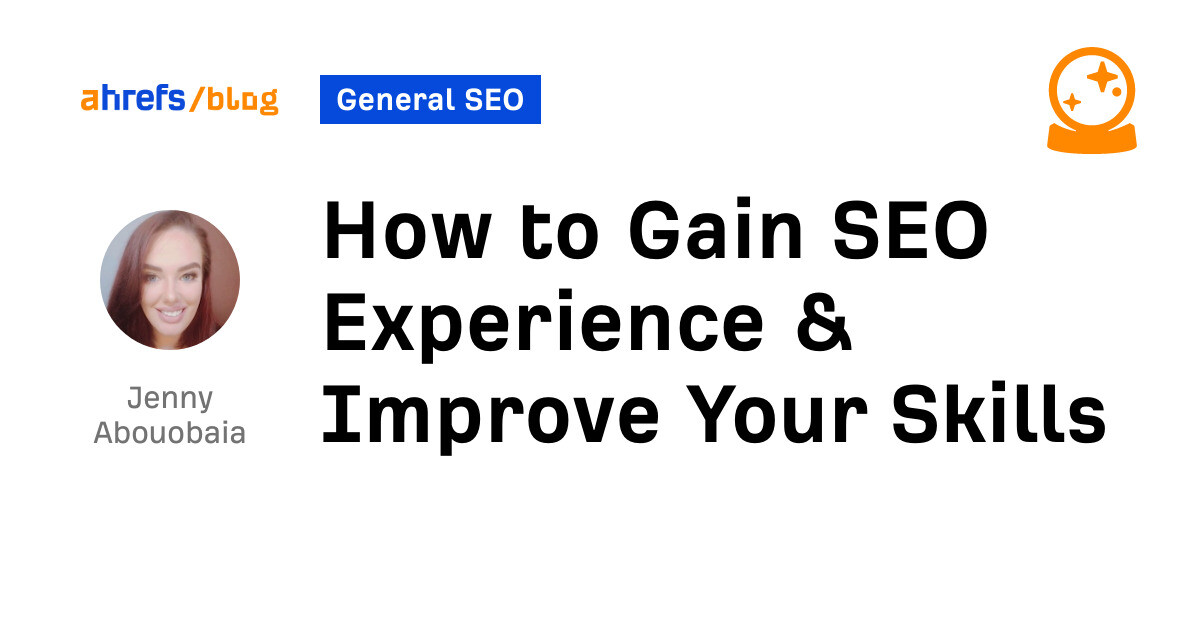
Of course, the idea of learning any new craft is daunting. For many looking in from the outside, SEO can seem like some Hogwarts-level digital wizardry. However, in an ever-changing world of Google updates and advancing AI, even OG SEOs will tell you they are always learning.
But with an abundance of blogs, Youtube channels, and courses out there dedicated to sharing SEO knowledge, it can be challenging to know what SEO experience you really need to get started with a career in search.
In this article, we’ll look at which essential SEO skills and knowledge you need to develop and how to build an SEO portfolio and gain SEO experience.
It’s important to start with a couple of cautionary statements.
First, know that even the best guidance and advice aren’t right for everyone. Every website is different. Therefore, each has its own needs and things that work. The type of website and industry also play a massive role in what a site needs.
Secondly, the skills and knowledge you need to develop will depend on your specialty. For example, a content specialist will ultimately need an in-depth knowledge of on-page optimization above all else.
But having a rounded understanding of all elements of SEO is always important, regardless of whether you intend to be a generalist or a specialist.
Learn your SEO fundamentals
Understanding the fundamental elements of SEO is one of the most important aspects when looking to gain SEO experience. Let’s look at the fundamentals, why they are important, and what they include.
Keyword research
Keyword research is the foundation of SEO. If you want to gain SEO experience, this is the first aspect you need to understand.
Keyword research is finding which search queries your target audience is typing into search engines like Google when looking for products, services, or information.
Remember that the main goal of any search engine is to offer the most relevant and helpful answer to a search query. Keywords allow you to optimize your pages efficiently so that search engines understand your content and how it meets the search intent.
It doesn’t matter whether you’re working on the website for a local business, an affiliate site, or a hobby blog. If you produce content on a topic that no one is searching for, you won’t get any traffic from search engines to those pages.
This is one of the biggest mistakes new businesses make. Many do not understand the need or importance of keyword research, and this is part of the reason why studies show that 90.63% of pages on the internet get no traffic from Google.
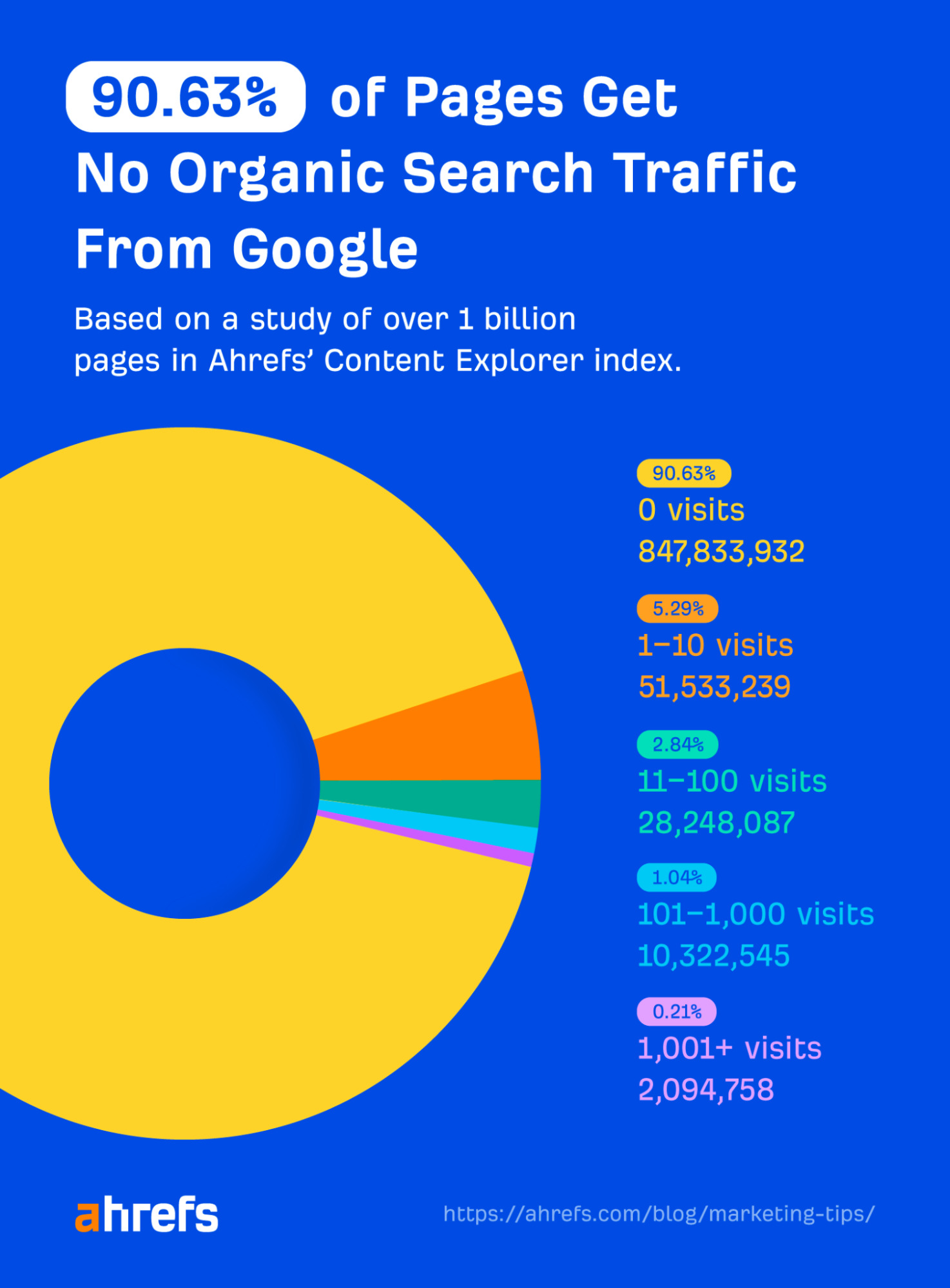
Some different aspects of keyword research include:
Ahrefs’ Keywords Explorer is a great place to start gaining experience performing keyword research. It can help you with finding long-tail keywords, keyword mapping, clustering, and more.
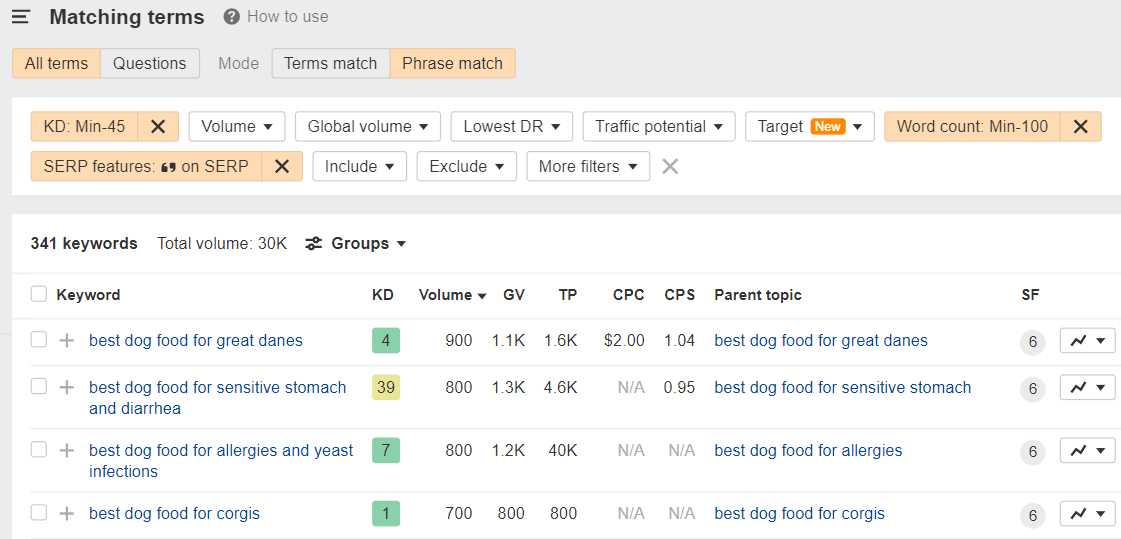
On-page optimization
I can’t stress enough how important gaining experience in on-page SEO is. For things like technical or off-page SEO, it’s common to have a specialist handle them. But if you want to work in the SEO field, you must have a clear understanding of what on-page is and how it works.
On-page SEO is optimizing your website’s pages to achieve higher rankings in the search engine results pages (SERPs).
On-page optimization allows you to work on aspects of a website you can control. Sometimes, even small, basic changes can make a huge difference in a website’s rankings.
When done well, on-page optimization can assist Google in understanding your content, how pages relate to one another, and how your pages connect to individual search queries.
Common on-page optimizations include:
Off-page optimization
Unlike on-page, off-page optimization focuses on aspects that you cannot control on your own site but can still influence your rankings on the SERPs. This mainly consists of link building and brand marketing.
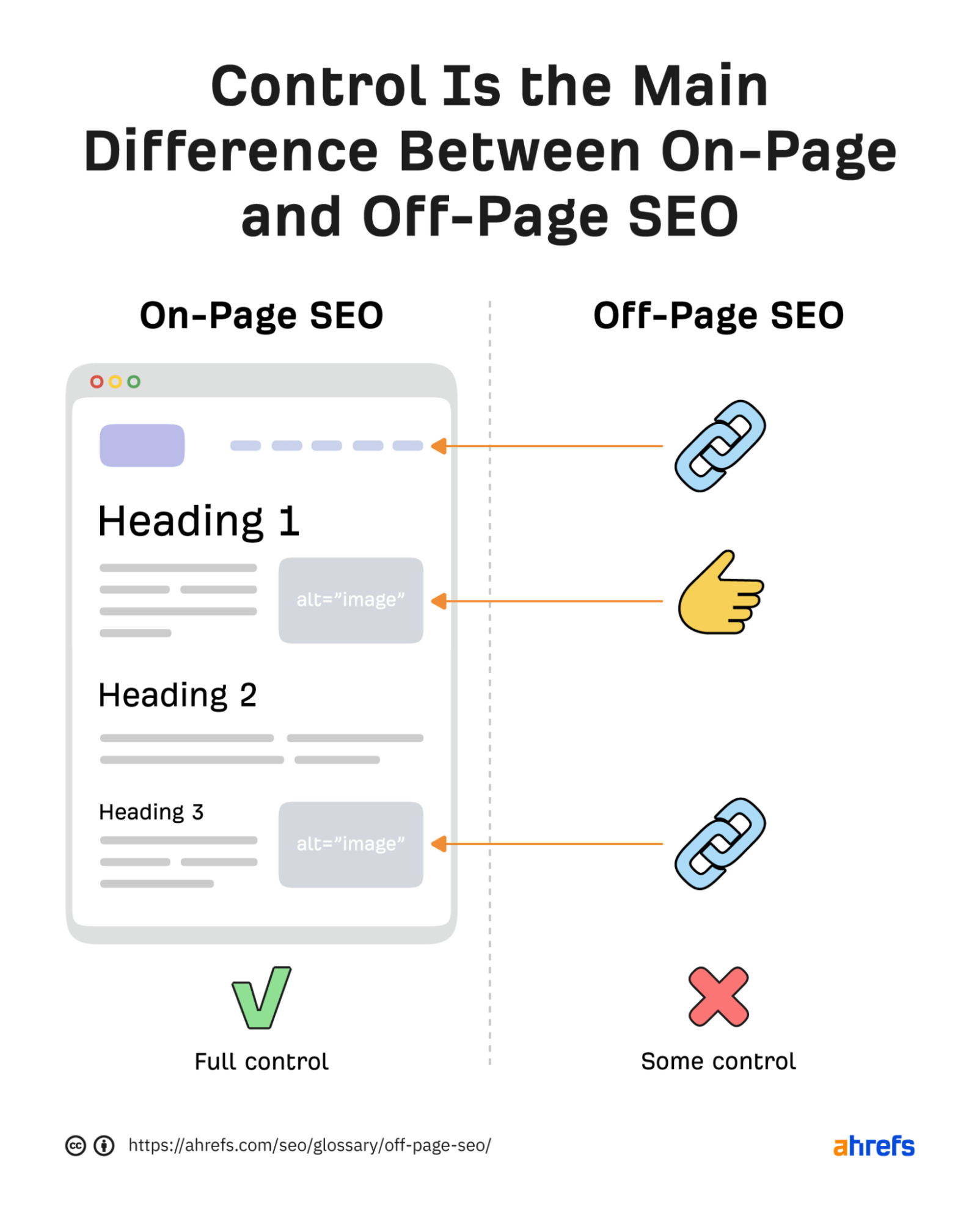
When determining which queries you should rank for and where on the SERPs, Google considers external factors, such as backlinks.
Popular off-page techniques include:
These techniques can help influence your rankings on the SERPs by promoting topical relevance and perceived authority with search engines.
If you’re interested in learning more about off-page SEO and, in particular, link building, check out our free advanced link building course.
Technical SEO
Technical SEO is the process of making technical improvements to your website to ensure search engines can find, crawl, and index it.
Technical SEO is incredibly important. Ensuring your website is technically sound is a core foundation of SEO.
When it comes to gaining SEO experience, you wouldn’t expect to perform advanced technical tasks as a newbie. But ensuring your website can be indexed, for example, means your website can even appear on the SERPs in the first place.
So even though you may not want to be a technical specialist, it’s important to at least understand what the different aspects of technical SEO are and how they affect your website.
Some common technical SEO elements include:
Learn how to use essential SEO tools
There are several essential tools that every SEO needs to get to grips with, including Google Analytics and Google Search Console. Understanding how these tools work and how to use them means you can properly evaluate your website’s SEO performance.
However, some additional tools can be added to your stack to assist you with your day-to-day SEO duties, helping you work smarter, not harder.
Many tools can significantly cut down the time needed to do specific tasks, leaving you more time to focus on the areas that need your skills and expertise. Tools can also help to set up automated tasks.
Using a tool like Ahrefs’ Site Audit means you can set up automated weekly or monthly website audits. This can be incredibly helpful in alerting you if something has gone wrong somewhere on your site and then prompt you to take an in-depth look at the issue when alerted.
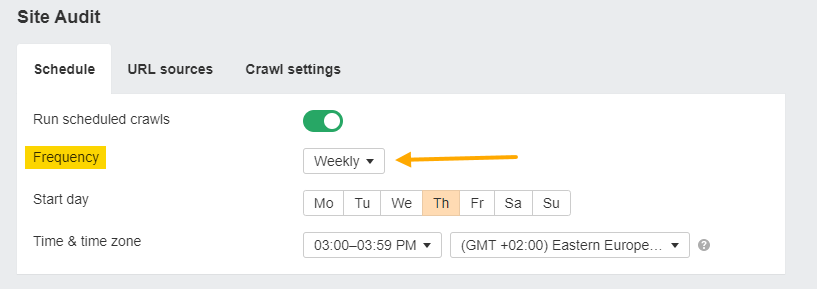
Here are some examples of tools you may want to include in your stack:
- Website auditing tool
- Keyword research tool
- Content optimization tools
- Rank tracking tool
Trying to land yourself an SEO job can be a chicken-and-egg situation. For example, when looking to work as a freelancer, no one is willing to give you work without proven experience. But how do you get experience without doing the work?
Well, there are some ways you can enhance your skills and work on sites that can become part of your portfolio without landing freelance clients.
Personal projects
The easiest way to get started is to build your own digital assets. With as little as a domain and hosting, you can get started building a site and optimize it for search engines.
This can be a way to try every aspect of SEO. You can even make mistakes and learn without sending someone’s online business crashing. It also lets you see which areas you prefer to work in and which aspects you may have a natural talent for.
Even after years of working in the industry, I still use several sites solely for testing purposes. This allows me to try new things, see what works and doesn’t, and hone my craft.
Skill exchanges
Skill exchanges are not something new. Often, it’s a win-win situation for both parties because both get what they want simply by offering their time or services as repayment.
In fact, a good example is Skill Harbour, a skill exchange platform. It allows you to post your needs with the offer of exchanging them for your skills.
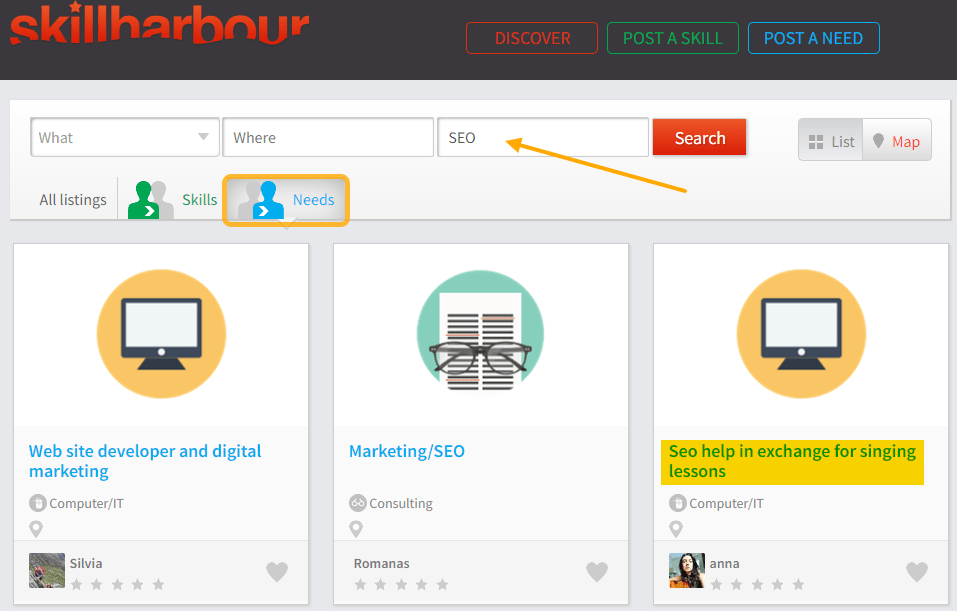
Is there a personal trainer at your gym who needs a website and can give you some PT sessions in exchange? Or maybe a local dance studio’s website needs on-page optimization and, in return, the studio is willing to give your kids some ballet lessons?
Skill exchanges are a great way to build experience and add to your portfolio. Plus, as the other party is not investing their hard-earned cash, they are more likely to give you a chance even if you have little to no proven experience.
Charity work
Similar to skill exchanges, offering your skills and services as a volunteer to different organizations allows you to build your experience and portfolio.
Websites like Devon Voluntary Action allow you to search for volunteer opportunities based on your skills.
You can also contact charity organizations that could use some SEO assistance. You can simply perform a Google search for charities in your area (or further). With Ahrefs’ SEO Toolbar, it’s easy to see the metrics for each site directly on the SERPs.
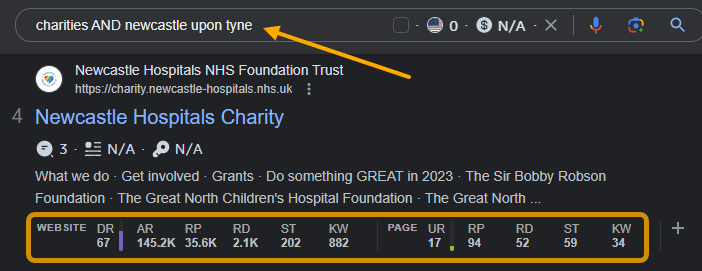
This can help you identify which websites could use some additional SEO help to narrow down a list to reach out to.
Internships
There is no better way to gain experience in SEO than actually doing the work. Internships allow you to work on real-world projects while gaining training from a team of experts in some of the biggest, industry-leading companies.
Internships are rarely paid positions. Much like a skill exchange or charity work, they let you build your skills, experience, and knowledge in return for your time.
On-the-job experience
Although working freelance or in-house is probably not an option for SEO newbies, there are some SEO agencies that take junior-level SEOs and offer on-the-job training. Unlike internships, these are paid positions, but you can expect to be at the bottom of the ladder.
This gives you first-hand experience working on multiple websites and the opportunity to learn from seasoned professionals. Many agencies also have career progression opportunities, allowing you to work your way up the ranks as your skills progress.
One thing about SEO is that it is constantly evolving. This is one of the best parts of SEO for someone like me who loves to learn. However, it does mean that if you want to be (or remain) an expert, you must continuously stay up to date with what is happening.
There are always new algorithm updates to navigate, tools to try out, and what works today won’t necessarily work next year.
Following industry leaders and blogs, as well as the illusive “SEO Twitter,” all help you to keep your finger on the pulse with the hottest conversations. Also, following SEO podcasts and newsletters helps you to gain insights from top experts every week.
Final thoughts
Gaining experience is the first crucial step to pursuing a career in SEO. Getting to grips with the fundamentals and gaining real-world experience are key aspects of improving your skills and knowledge.
If you’re looking to get started with SEO, a great place to start is with our free SEO training course.
Got questions? Ping me on Twitter.

![How AEO Will Impact Your Business's Google Visibility in 2026 Why Your Small Business’s Google Visibility in 2026 Depends on AEO [Webinar]](https://articles.entireweb.com/wp-content/uploads/2026/01/How-AEO-Will-Impact-Your-Businesss-Google-Visibility-in-2026-400x240.png)
![How AEO Will Impact Your Business's Google Visibility in 2026 Why Your Small Business’s Google Visibility in 2026 Depends on AEO [Webinar]](https://articles.entireweb.com/wp-content/uploads/2026/01/How-AEO-Will-Impact-Your-Businesss-Google-Visibility-in-2026-80x80.png)















